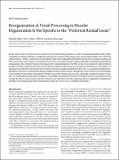Reorganization of Visual Processing in Macular Degeneration Is Not Specific to the "Preferred Retinal Locus"
Author(s)
Baker, Chris I.; Peli, Eli; Dilks, Daniel D.; Kanwisher, Nancy
DownloadDilks-2009-Reorganization of Vi.pdf (224.1Kb)
PUBLISHER_POLICY
Publisher Policy
Article is made available in accordance with the publisher's policy and may be subject to US copyright law. Please refer to the publisher's site for terms of use.
Terms of use
Metadata
Show full item recordAbstract
Recent work has shown that foveal cortex, deprived of its normal bottom-up input as a result of macular degeneration (MD), begins responding to stimuli presented to a peripheral retinal location. However, these studies have only presented stimuli to the "preferred retinal location," or PRL, a spared part of the peripheral retina used by individuals with MD for fixating, face recognition, reading, and other visual tasks. Thus, previous research has not yet answered a question critical for understanding the mechanisms underlying this reorganization: Does formerly foveal cortex respond only to stimuli presented at the PRL, or does it also respond to other peripheral locations of similar eccentricity? If foveal cortex responds to stimuli at PRL because it is the long-term habitual use of this region as a functional fovea that drives the formerly foveal cortex to respond to stimuli presented at the PRL (the "use-dependent reorganization" hypothesis), then foveal cortex will not respond to stimuli presented at other locations. Alternatively, it may be that foveal cortex responds to any peripheral retinal input, independent of whether input at that retinal location has been chronically attended for months or years (the "use-independent reorganization" hypothesis). Using fMRI, we found clear activation of formerly foveal cortex to stimuli presented at either the PRL or an isoeccentric non-PRL location in two individuals with MD, supporting the use-independent reorganization hypothesis. This finding suggests that reorganization is driven by passive, not use-dependent mechanisms.
Date issued
2009-03Department
Massachusetts Institute of Technology. Department of Brain and Cognitive Sciences; McGovern Institute for Brain Research at MITJournal
Journal of Neuroscience
Publisher
Society for Neuroscience
Citation
Dilks, Daniel D et al. “Reorganization of Visual Processing in Macular Degeneration Is Not Specific to the "Preferred Retinal Locus".” J. Neurosci. 29.9 (2009): 2768-2773. © 2009 The Society for Neuroscience
Version: Final published version
ISSN
1529-2401